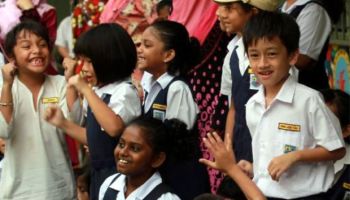Penang Free School:
https://en.wikipedia.org/wiki/Penang_Free_School
Penang Free School, the first English school in the country, turns 200 in a week. It was, and remains, a school for the brave and the true. And for the Free.
WE’RE on the cusp of history. A week from today, the oldest English school in the country, Penang Free School, will turn 200. It’s a proud moment for the school. And for yours truly. I spent my formative years in that school.
It’s the kind of school that cliches are made off – you can take a student out of Free School but you can never take the Free out of the students. We will always be Old Frees.
The old boys are already celebrating. There have been golf tournaments, dinners and get-togethers lined up. There was a 73-day, 20,000km road convoy from Penang to Dittisham, Devon, in Britain, where the founder of PFS, Reverend Robert S. Hutchings, was born.
The six-vehicle convoy left on July 17 and arrived at its destination on Oct 3.
The huge school field is now covered with canopies waiting for the thousands of Old Frees who will gather there on Oct 21 to celebrate the grand old dame’s birthday.
The field is one of the things most Old Frees would remember. It was both a blessing and a bane. With two football fields, three hockey pitches and a cricket pitch, it was great for outdoor activities.
The track around the field was good training ground for long-distance runners. But for the errant ones in school, it was a pain. The teachers made you run around the field as punishment. If you were not athletically inclined, that was punishing indeed.
But it was the teachers who made the school wonderful. We had some of the best and most dedicated teachers – not just in the subjects they taught but also in sports.
There was Wilson Doss, the cricket-mad teacher. He played for Selangor, Penang and even in international matches and he would try to get every lad in the school to give the sport a try-out.
I have to admit to being an absolute flop at it. With only the experience of playing “rounders” with the neighbourhood gang, I would hurl the cricket bat away as I ran. And Mr Wilson would growl.
There was N. Vallupillay, the hockey coach with the kindest of souls. He, too, would try to get everyone to play hockey and among the top players he nurtured was former national captain Ow Soon Kooi.
With Vallupillay at the helm, PFS was the state’s school hockey champion for 20 years from 1964 to 1984. The rivalry with St Xavier’s Institution and the Bukit Mertajam High School was intense, sometimes even rowdy.
Vallupillay then moved to George Town Secondary School and voila, that school became another hockey powerhouse in the state.
Then, there was Johnny Ooi, yet another teacher who was very much into hockey and who took over when Mr Vallupillay left.
Ooi Bee Seng was the basketball man. Under his watch, more basketball courts were built and more of the students turned to the game.
Nai Bej Sararaks was the athletics guy. Every now and then, he would bundle a gang of us into his beat-up jalopy and drive us off to training. The one I vividly remember was when we ran up Penang Hill from what Penangites know as Moongate.
The man waited at the bottom of the hill as the bunch of us ran up to the top of the hill and later scrambled all the way down. He was there with some juice before taking us all back to the school.
There was no need then for sports schools or schools of excellence. The teachers delivered. It’s been some years but I believe the teachers in the school are still a dedicated bunch.
But the real wonder of the school is the belief on which it is built – that it should be free from religion and open to all.
It’s a very strange thing. At a time when almost all education was under the care of priests (or brothers), there was one Rev Hutchings who did not want to impose his religious beliefs on the local populace.
When Hutchings first petitioned for a “free school”, his aim was to provide a school to educate, feed, and clothe orphans and poor children. It wasn’t about religion – only about education.
Yes, there was a bit of “free” in the financial sense. Only those who could afford it were asked to pay $3, $2, and $1 per year. Poor children were exempted.
The country has come a long, long way from then. Education standards have slumped. We have been dithering over the direction we want to take. Sports in schools is no longer a big thing. Few teachers believe in the power of sports.
Instead, religion has come into schools in a big way. There is a lot of emphasis on religious education and rituals, causing our children to drift apart from one another.
There really is a need for more new “free” schools – schools where education and sports are where the emphasis is.

Why Not? By Dorairaj Nadason is The Star’s Executive Editor.
The writer, who can be reached at raj@thestar.com.my, still salutes the gates of the school when he drives by. She is, after all, alma mater – the mother who nurtured him.
Related posts:
Malaysian Minister admits poor education system, students are below par
Malaysia's Education Setback
|
Dec 23, 2015 ... I strongly urge public universities and the Education Ministry to fix the ... to
collectively improve the standard of tertiary education in Malaysia.
| |
|
Jul 4, 2016 ... In 1995, Project 211 was initiated to raise research standards of about 100 ....
The Malaysian Education: bleak and bright side, a wake .
|









